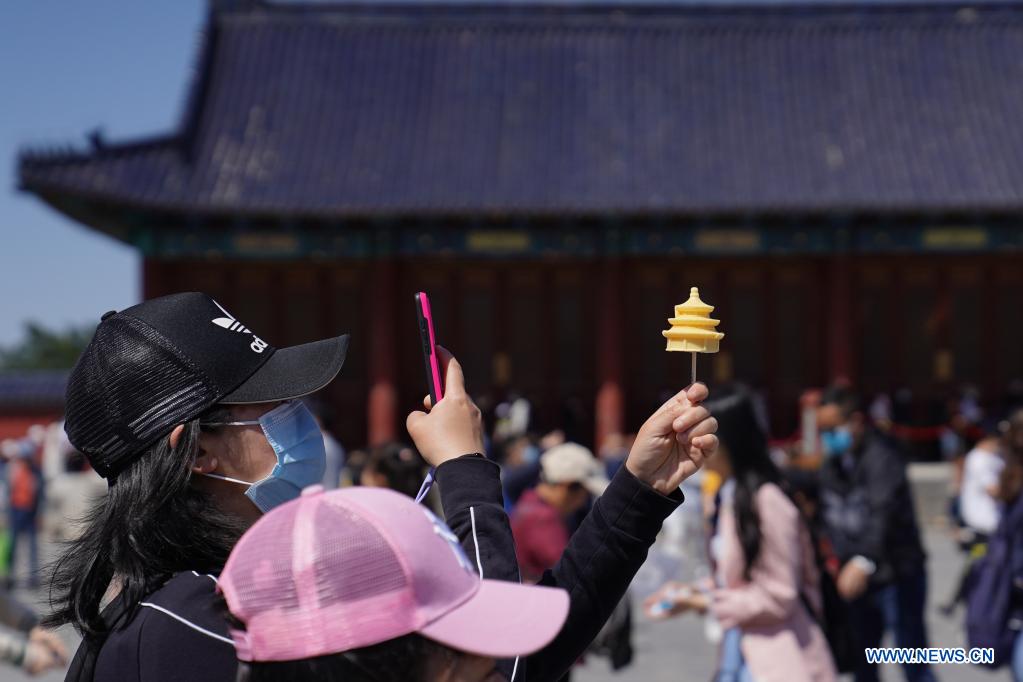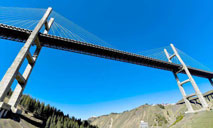China sees boom in online tourist consumption
China's online travel sector has experienced a boom thanks to the burgeoning development of advanced technologies, with total consumption reaching the trillion-yuan level.
"Internet plus", which has become a new mode of travel and a new engine for smart tourism, will speed up ecological integration and innovation in the tourism industry and bring more opportunities for the management and smart marketing of tourism, according to a report recently released by the China Tourism Academy.

A tourist takes photos of an ice cream in the shape of the Hall of Prayer for Good Harvest at the Temple of Heaven in Beijing, capital of China, May 4, 2021. Official data showed 230 million domestic tourist trips were made during the five-day Labor Day holiday, up 119.7 percent from last year. (Xinhua/Ju Huanzong)
During this year’s Labor Day holiday, various tourist attractions across the country ensured that their admission tickets could be booked via online platforms in order to stagger visitors so they came at different times and better control the pandemic.
Online reservation systems allow tourist destinations to carry out reception work in a more orderly manner, and tourists to plan their itineraries more reasonably, thus effectively optimizing tourism quality, explained Bai Kai, director of the tourism department of Shaanxi Normal University.
At the same time, it has become common practice for scenic areas to monitor data such as the number of appointments, daily number of tourists received and instantaneous carrying capacity through big data platforms.
For instance, Xiandu Scenic Area in Jinyun county, east China's Zhejiang province, has installed 400 cameras to detect traffic density, prevent the concentration of too many tourists in a single spot and optimize their visiting experience.
"At present, the best example of smart tourism can be reflected in the analysis, research and application of the flow of people via big data," said Dai Xuefeng, a researcher with the Chinese Academy of Social Sciences.
Dai pointed out that through the analysis of subdivided data such as tourists' moving trajectory, consumption tendency and service preferences, scenic areas can enrich their products, provide more targeted services and improve their management.
An intelligent tourism platform launched by southwest China's Guizhou province serves as a good example of these efforts. By utilizing technologies including big data, 5G live streaming and blockchain, the tourist platform offers a variety of tourist information and product services, ranging from A-grade scenic areas and hotels to catering and travel tips.
Furthermore, live streaming is also being utilized to boost tourists' offline consumption. In 2020 alone, more than 40,000 tourism-themed live streaming activities were conducted via Weibo, China's main social media platform for microblogging, garnering over 2 billion views.
"Digital technology can help optimize tourists' experience," said Pan Helin, executive dean of the Digital Economy Research Institute of Zhongnan University of Economics and Law, explaining that this technology can push forward the integration of culture and tourism, thus making the sector more innovative.
Photos
Related Stories
- China to improve international competitiveness, influence of tourism services
- Highlights of 2021 Madrid Tourism Expo
- China's 2019 "red tourism" revenue tops 400 bln yuan
- Italy reopens to int'l tourism, sparking optimism for businesses
- Spain's tourism minister expects 45 mln foreign tourists in 2021
- China launches 300 new rural tourist routes
- Scenic spots in ice cream competition to attract tourists
- China sees robust tourism during May Day holiday
- China sees surging passenger trips during May Day holiday
- Spain's tourism sector looks to China as lever to reactivate industry: expert
Copyright © 2021 People's Daily Online. All Rights Reserved.










